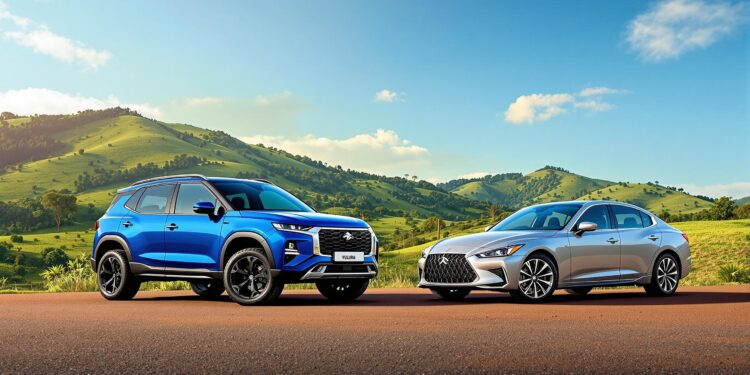Choosing between an SUV and a sedan depends on Uganda’s diverse road conditions and your driving needs. Here’s the quick answer:
- SUVs are ideal for rough rural roads, rainy seasons, and carrying heavy loads but are more expensive to buy and maintain.
- Sedans are perfect for city driving, offering better fuel efficiency, lower costs, and easier handling in urban areas.
Quick Comparison
| Feature | SUV | Sedan |
|---|---|---|
| Ground Clearance | High (better for rough roads) | Low (best for paved roads) |
| Fuel Efficiency | Lower | Higher |
| Urban Maneuverability | Harder in tight spaces | Easier to handle |
| Rural Road Performance | Excellent | Limited |
| Initial Cost | Higher | Lower |
| Maintenance | Higher but durable | Lower for city use |
If you drive mostly in urban areas like Kampala, a sedan is a cost-effective option. For rural areas or rainy seasons, an SUV offers better performance and safety. Compact SUVs, like the Toyota Rav4, can also balance both urban and rural needs.
Read on for a detailed breakdown of costs, road performance, and tips for driving in Uganda.
Should You Buy a SEDAN or an SUV?
Important Factors to Think About
When choosing between an SUV and a sedan for Ugandan roads, there are several key aspects to weigh. Let’s break them down to help you make the best decision.
Road Types and Driving Conditions
Uganda’s roads vary widely – from smooth urban streets to rough dirt and gravel paths in rural areas. During the rainy season, conditions can worsen significantly, with potholes, mud, and flooding becoming common challenges [1]. Vehicles with higher ground clearance, like SUVs, are better suited for these situations. However, fuel costs are an ongoing concern for many Ugandan drivers, making efficiency a critical consideration.
Fuel Use and Costs
Fuel consumption is a major factor in vehicle ownership costs. SUVs handle rough terrain better but generally use more fuel compared to sedans [2]. Here’s a quick comparison:
| Vehicle Type | Off-road Capability | Fuel Efficiency |
|---|---|---|
| Sedan | Limited | High |
| SUV | Good | Moderate |
While SUVs excel in tougher conditions, sedans are a better choice for those looking to save on fuel. But don’t forget to factor in maintenance costs, which can add up over time.
Maintenance and Spare Parts
The availability of spare parts can greatly influence repair costs and how quickly a vehicle can be fixed. Here are some points to keep in mind:
- Spare parts for popular SUV models are easier to find.
- Sedans may require more frequent repairs if used on rough roads.
- Parts availability directly impacts both cost and repair time.
Understanding these factors can help you avoid unexpected expenses and delays.
Cost and Affordability
The overall cost of owning a vehicle goes beyond the purchase price. Here’s a breakdown of the financial aspects for both vehicle types [2][4]:
| Cost Factor | Sedan | SUV |
|---|---|---|
| Initial Purchase | Lower | Higher |
| Fuel Consumption | Cheaper | More expensive |
| Maintenance | Lower for urban use | Higher but built for tough conditions |
| Insurance | Lower | Higher |
For urban drivers, sedans are a more economical choice. On the other hand, SUVs are worth the investment for those who frequently drive in rural areas or during the rainy season [2]. Take a close look at your driving habits and priorities to find the right balance between cost and performance.
sbb-itb-7bab64a
SUVs vs Sedans: A Detailed Comparison
Let’s dive deeper into how SUVs and sedans stack up when it comes to driving in Uganda, considering road conditions, costs, and everyday practicality.
Why SUVs Work Well
SUVs, like the Toyota Land Cruiser, are a top pick for Uganda’s rugged roads. Their high ground clearance and sturdy design make them perfect for navigating rough terrain, including trips to places like Bwindi Impenetrable National Park [1]. Plus, their roomy interiors are great for families or businesses needing to carry bulky items [2]. A favorite among Ugandan drivers, the Toyota 4Runner, is also known for its durability on tough roads.
Why Sedans Make Sense
Sedans, such as the Toyota Corolla, are ideal for city driving in areas like Kampala. Their compact size makes weaving through traffic and parking much simpler. They also offer a smooth ride on paved roads, thanks to their lower center of gravity [2]. Maintenance is another plus – sedans often have simpler mechanics, and spare parts are easy to find across Uganda [5].
SUVs vs Sedans: Key Differences
Here’s a quick comparison to highlight the main distinctions between SUVs and sedans for Ugandan drivers:
| Feature | SUVs | Sedans |
|---|---|---|
| Ground Clearance | High (great for rough roads) | Low (best for smooth roads) |
| Fuel Efficiency | Lower | Higher |
| Road Performance | Handles rural terrain well | Perfect for city driving |
| Rainy Season Handling | Better traction and safety | Struggles in heavy rains or floods |
| Cargo Space | Lots of room | Limited space |
"The Toyota Rav4 has proven particularly popular among travelers and car hire services in Uganda due to its remarkably low maintenance costs", according to a recent industry report [3].
Both SUVs and sedans have their strengths. SUVs shine in rural areas and challenging conditions, while sedans are practical, efficient, and perfect for urban life [2][4].
Tips for Ugandan Drivers
City Driving vs Rural Driving
Choosing the right vehicle in Uganda depends heavily on where you drive. For city driving in places like Kampala or Entebbe, sedans are a smart choice. They’re fuel-efficient, easy to handle in heavy traffic, and much simpler to park in tight urban spaces [1].
On the other hand, if your travels often take you to rural areas, an SUV is a better fit. Models like the Toyota Land Cruiser or 4Runner are designed to handle unpaved roads with ease. Their stability and control make them ideal for rough terrain [1][2].
| Driving Environment | Recommended Vehicle | Key Benefits |
|---|---|---|
| Urban (Kampala, Entebbe) | Sedan | Fuel-efficient, easy to park, smooth handling |
| Rural (National Parks, Villages) | SUV | High ground clearance, strong traction, extra cargo space |
| Mixed Use | Compact SUV | Combines city-friendly size with off-road capability |
Uganda’s weather, especially during rainy seasons, also impacts vehicle performance and should influence your choice.
Driving During Rainy Seasons
Driving in Uganda’s rainy seasons can be tricky, with muddy roads and flooding posing serious challenges. SUVs equipped with four-wheel drive are especially useful in these conditions, as they handle slippery and uneven roads much better than smaller vehicles [2][4].
"Understanding the specific needs of different terrains is crucial. For instance, accessing Bwindi Impenetrable National Park requires a 4×4 vehicle due to the challenging terrain, especially during wet conditions", explains local transportation experts [1][2].
Here are some key tips for driving during the rainy season:
- Stability control helps prevent skidding, while anti-lock brakes ensure safer stopping on wet surfaces.
- Keep your tires in good condition with plenty of tread for better grip.
- Always maintain at least half a tank of fuel, especially in rural areas where fuel stations are scarce [1].
While sedans can manage city rain fairly well, they’re not built for muddy rural roads or flood-prone areas. If your travels take you beyond urban centers during the rainy season, an SUV is the more practical choice for Uganda’s diverse and often unpredictable conditions [2][4].
Conclusion: Choosing the Best Car for You
Picking the right car in Uganda comes down to your driving conditions, budget, and personal needs. If you’re navigating rural areas or dealing with heavy rains, SUVs like the Toyota Rav4 are a solid option. They handle tough roads well and have spare parts that are easy to find [3]. On the other hand, sedans are a smart choice for city drivers, offering great fuel efficiency and being well-suited for urban settings [2][4].
Think about where you’ll be driving most of the time. If your routes often take you through rough terrain or you need a vehicle that can handle rainy seasons, an SUV with 4WD might be the way to go [1][2]. However, if your driving is mostly on smooth roads in places like Kampala or Entebbe, a sedan’s lower purchase price and cheaper maintenance make it a practical alternative.
Budgeting for the long haul is also key. SUVs may cost more upfront and require higher maintenance, but they can be worth it if you’re frequently driving on challenging roads. For city drivers, sedans are easier on the wallet with their lower fuel consumption and maintenance costs [2][4].
If you’re looking for something in the middle, compact SUVs like the RAV4 might strike the right balance. These vehicles combine features that work well in the city with the ability to handle some off-road conditions [3]. Plus, they tend to be more fuel-efficient than larger SUVs while still being versatile enough for Uganda’s varied roads.
The best vehicle for you depends on weighing your driving environment, budget, and what matters most to you. Take some time to think about how the car will meet your needs across Uganda’s diverse terrains and weather before making your choice.
Related Blog Posts
- 8 Essential Car Maintenance Tips for Uganda’s Climate
- Common Car Problems in Uganda: Solutions Guide
- Top 7 Platforms for Buying Car Parts Online in Uganda
- Uganda’s Localization Policies in Automotive Manufacturing




